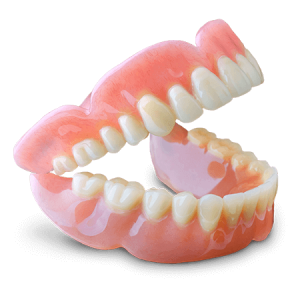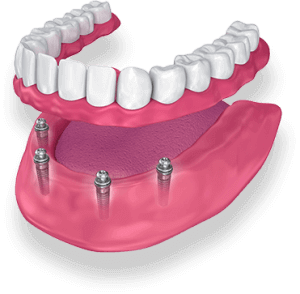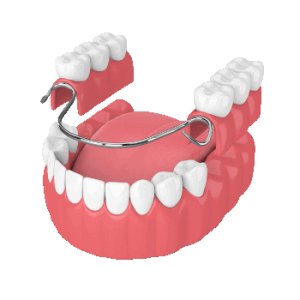Dentures
Got Missing Teeth?
Looking for an Affordable Teeth Replacement Option?
Dr. Patel has been providing quality affordable Dentures with customized fit for many years. She uses high tech digital 3D technology and high-quality materials to create dentures that look and feel like natural teeth. Every Denture is personalized to the patient’s desired tooth shape, color and size to provide an optimum appearance.

Types of Dentures
Complete, Partial and
Implant Supported Dentures
Dentures make it easier to munch, eat and speak normally. They also keep any remaining teeth you have from drifting out of position, which avoids a range of dental problems. When you lose all your teeth, your appearance will look older. They can help fill out the appearance of your face and restore your smile, giving you the confidence to show off your pearly whites without feeling embarrassed about missing teeth. With proper maintenance, dentures can survive for many years.
Complete Denture
Typically used when all the teeth are missing. There are two types of Complete Dentures.
- Conventional – Are made after the remaining teeth have been removed and the gum tissue has begun to heal. They are ready for placement in the mouth about 2 to 3 months after the teeth have been removed.
- Immediate – Are made in advance and are ready to wear as soon as the teeth are removed so that you do not have to be without teeth during the healing period. However, the disadvantage is you’ll need more adjustments or realignment since bones and gums shrink over time, especially during the healing period following tooth removal. Usually these are considered as a temporary solution until conventional dentures can be made.
Partial Denture
Are used when one or more natural teeth remain in the upper or lower jaw. There are two types of Partial Dentures:
- Removable – Consists of replacement teeth attached to a gum-colored plastic base. Removable partials are linked by a metal framework that helps keep them in place.
- Fixed – Replace one or more missing teeth by placing a dental crown on each tooth surrounding the space and attaching replacement teeth to the crowns. This bridge is then cemented into place.
Implant Supported Denture
They don’t rest on the gums like conventional dentures do. They are held together by dental implants and therefore are more reliable. Many of our patients report this type of denture feel and function more like their natural teeth. Please note that this option does require extra time since the patient needs to undergo implant placement surgery. Which typically adds 3 months or so to the treatment timeline.
Are Dentures right for You?
Request a Complimentary Consultation with Dr. Nimisha Patel. She will be more then happy to answer any questions or provide second opinion at no charge.
How To Care For Your Dentures
Even if you wear complete dentures, you must practice good dental hygiene. Brush your gums, tongue, and roof of your mouth every morning with a soft-bristled brush before you put in your dentures to stimulate circulation in your tissues and help remove plaque.
Like your teeth, your dentures should be brushed daily to get rid of food particles and plaque. Brushing also can help maintain the teeth from staining:
- Wash your dentures before brushing to remove any loose food or debris.
- Use a soft bristle toothbrush and a non-abrasive cleanser to brush all the dentures’ surfaces gently so they don’t get scratched.
- When brushing, clean your mouth fully including your gums, cheeks, the roof of your mouth, and tongue to remove any plaque. This can help reduce the risk of oral pain and bad breath.
- When not wearing your dentures, please put them in a safe place covered in water to keep them from warping.
- Occasionally, denture wearers may use adhesives. It comes in many forms: creams, powders, pads/wafers, strips, or liquids. If you apply one of these products, read the instructions, and use them precisely as directed. Your dentist can advise appropriate cleansers and adhesives; look for products with the ADA Seal of Acceptance. Products with the ADA Seal have been evaluated for protection and effectiveness.
FAQs About Dentures
They may feel awkward or loose for the first few weeks until your mouth learns to keep them in place. You may encounter some minor irritation, soreness and increase in saliva flow when you first start wearing dentures. But these things usually get better as your mouth gets used to the dentures. Follow-up appointments at our Buford Dental Office are generally needed after a denture is inserted so the fit can be checked and adjusted. If any problem persists, particularly irritation or soreness, be sure to call us and consult with our Buford Dentist.
You may find difficult to pronounce some words, so practice saying those words out loud for awhile. If your dentures click while you’re speaking, contact our Dental Office.
Dental implant is a better alternative, and it closely resemble the feel of real teeth. However the cost is usually greater, and not everyone is a candidate for implants. Schedule a FREE consultation with our Buford Dentist to discuss if Dental Implant is right for you.
Most dental insurance providers cover some or all of the cost. As a courtesy to you, we will contact your insurance company to get the specifics of your coverage and give you a written estimate showing what your insurance will pay and your out of pocket cost if any.
Dentures are designed to resemble your natural teeth. You will be able to speak, chew and look just like someone with natural teeth. In fact, dentures may even improve your smile and fill out your facial appearance.
Radiant Dental Is Surrounded With
So Much Love from All Over Georgia
Contact US
Address
Business Hours
| Mon, Wed | 8:30 AM – 5:00 PM |
| Tue, Thurs | 11:00 AM – 7:00 PM |
| Saturday | 8:00 AM – 2:00 PM |




